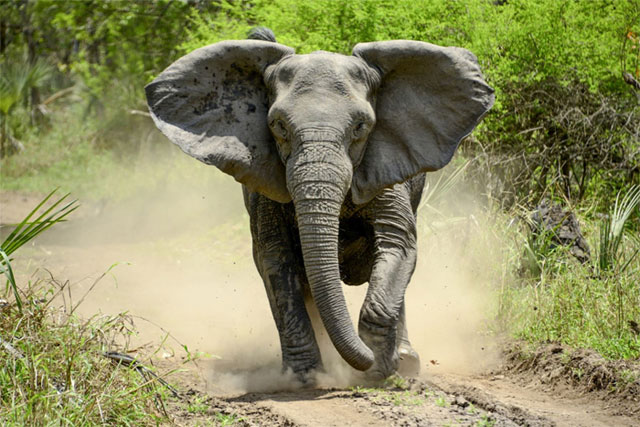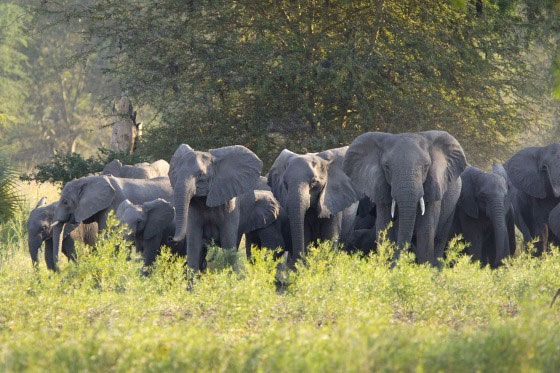Research in Mozambique shows that elephants in this country have grown up without tusks to protect themselves from poaching over the years.
According to NBC News, a strong pair of tusks is an advantage for elephants, helping them dig for water, strip bark from trees, and fight. However, during periods of intense human hunting for ivory, these tusks became a burden that could cost them their lives.
The study found that after many years of civil war and poaching in Mozambique, a significant number of elephants here will never grow tusks.

A tuskless elephant in Gorongosa National Park. (Photo: Shutterstock)
During the conflict from 1977 to 1992, both sides of the civil war in Mozambique often killed elephants for their tusks to fund the war. In the area now known as Gorongosa National Park, about 90% of elephants were killed.
The surviving elephants may share an important common trait: half of the female elephants now naturally lack tusks because they simply never grow them. In contrast, before the war, fewer than one-fifth of elephants were tuskless.
Similar to eye color in humans, genes determine whether elephants grow tusks, and this genetic trait is inherited from their parents. While tuskless elephants were once rare in Africa, this phenomenon is becoming increasingly common.
After the war, tuskless mother elephants passed this gene on to their female offspring, resulting in half of the female elephants being tuskless. What is perplexing is that two-thirds of their offspring are female.
Evolutionary biologist Shane Campbell-Staton at Princeton University believes that years of instability have altered the evolutionary trajectory of these elephants.
Along with colleagues, he investigated how the ivory trade influenced the scale of natural selection. His research findings were published in the journal Science on October 21.
Researchers in Mozambique observed around 800 elephants in Gorongosa National Park over several years to list mother elephants and their calves, discovering the aforementioned tuskless phenomenon.
At Gorongosa, the research team collected blood samples from 7 tuskless female elephants and 7 tusked elephants, and then analyzed the differences in their DNA.
The elephant survey data helped researchers identify the starting point: Since tuskless elephants are females, they focused on the X chromosome (female elephants have two X chromosomes, while males have one X and one Y chromosome).
They also suspected that the gene associated with tusklessness is common, meaning that female elephants only need one altered gene to be tuskless, and when this trait is passed to male elephant embryos, the development of male embryos is affected.
Brian Arnold, an evolutionary biologist at Princeton University, stated: “When mother elephants pass this trait to their offspring, we suspect that male calves may die early during fetal development, for example, through miscarriage.”

There were once 2,200 elephants in Gorongosa National Park. Now, the park has about 300 elephants left. (Photo: Getty Images)
Genetic analysis revealed two important regions of elephant DNA that they believe play a crucial role in the inheritance of tusklessness. Similar genes are also involved in tooth development in other mammals.
This study helps scientists and the public understand why human society can significantly influence the evolution of other life forms.
Most people believe that evolution occurs slowly, over hundreds or thousands of years, but humans can accelerate that process. In fact, tusklessness in elephants has only occurred in the past 15 years, and this is an astonishing outcome revealed by the research.
Due to the absence of tusks, elephants in Gorongosa have changed their diet, no longer stripping bark as before. Tuskless elephants primarily eat grass, while tusked elephants consume tougher vegetation. This change will likely persist for at least several generations of elephants.
Previously, researchers also noted unusual cases of tuskless elephants following intense poaching in Uganda, Tanzania, and Kenya. They wondered why female elephants have been tuskless for such an extended period.


















































